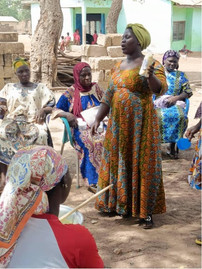2025 IWD Project Highlight: Capacity Building Training on Shea Butter Production for Economic Independence
- WC4E

- May 9, 2025
- 2 min read
By Portia Dumba

Women Changemakers for Education supported Porducare Enterprise and Gindabo FGCYDC's partnership to deliver a transformative three-day training in shea butter production. The initiative was held in Gindabor in the Savannah Region, empowered over 60 women with practical skills in processing, packaging, and marketing shea butter which is one of Ghana’s most valuable natural resources.
This project showed that with the right tools and training, women in rural communities can create products that compete on the market—while gaining confidence, community support, and financial autonomy. It aligned powerfully with the #AcceleratingAction theme of IWD 2025, advancing not just gender equity, but sustainable economic change.
Hands-On Learning
The training sessions focused on:
Advanced production techniques from shea nut grinding to final product refinement
Value addition through packaging and branding to increase product appeal
Cooperative formation for stronger market negotiation power
A Glimpse into the 3-Day Program
Participants were divided into practical groups, allowing for active learning and collaboration throughout.
Day 1: Team building, grinding in a neighboring community, frying demonstrations
Day 2: Paste preparation and oil extraction techniques
Day 3: Product packaging, branding education, and a vibrant cultural closing ceremony
Outcomes
Over 60 women now trained in shea butter processing
New interest in forming cooperatives to strengthen market access
Women gained skills to produce market-grade, high-quality products
Community-wide conversations sparked about investing in local processing infrastructure
“We didn’t just learn to make shea butter—we learned to create value, work as a team, and aim higher.”— Participant
Challenges & Next Steps
While the training was successful, the team faced several challenges:
Lack of a nut-crushing machine forced travel to nearby towns
Limited training resources and food due to high turnout and budget constraints
Plans are therefore underway to:
Fund a community nut-crushing machine
Mobilize more training materials for future cohorts
Build a local shea processing center to expand access and reduce barriers






































Comments